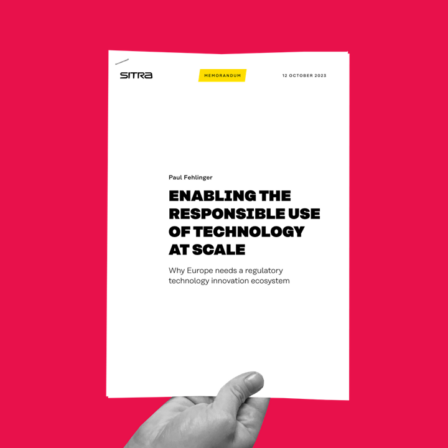Tools for applying digital regulation in business
Complex regulation poses challenges, especially for small businesses that lack large resources to meet the regulatory requirements. In a project funded by Sitra and the Technology Industries of Finland, tools are being developed for SMEs to master the EU’s digital legislation. Try the tools for free until March 2026.
What is it about?
The European Union has embarked on a historic legislative task aimed at enabling innovation and economic growth by creating a safe, fair and smooth digital environment for everyone.
The regulation is based on the European data strategy, aiming at:
- making Europe the global leader in a data-driven society;
- ensuring free movement of data within the EU and across sectors;
- providing access to high-quality data to foster creation and innovation;
- respecting European rules and values.
The regulatory framework with its numerous laws and guidelines is complex, and its practical application increases pressure on organisations: how can the smallest companies implement the regulation while striving to be innovative and competitive?
Regulatory technologies (RegTech) can offer an accessible way to navigate a complex environment. RegTech tools refer to software and infrastructure solutions that provide small organisations the means of large corporations in order to operate seamlessly in the regulatory jungle.
They clarify the application of the EU legislative requirements and strengthen small companies’ ability to innovate and develop new business models both in Finland and more broadly in the European internal market. With RegTech tools an organisation can for example determine in advance whether the AI Act applies to its offered or utilised systems or whether the Data Act enables access to new data resources.
A memorandum published by Sitra in 2023 indicates that regulatory technology solutions can accelerate innovation and growth, especially in the heavily regulated digital economy. Regulatory technologies have already revolutionised financial services when the regulation and obligations concerning the sector, such as risk management, were significantly tightened after the financial crisis of 2008.
In the near future, RegTech solutions can facilitate better use of data and accelerate responsible, state-of-the-art software and technology development in areas such as Web 3.0, augmented reality and artificial intelligence.
We help users of digital services and businesses understand the possibilities of complex digital regulation and support organisations in identifying new business and innovation opportunities in a changing operating environment. We provide information and concrete examples of evolving regulation in the Data Economy ABC material package (in Finnish), which is freely available to everyone. We encourage the use of course materials in educational institutions and business training.
What do we do?
Together with Technology Industries of Finland we are financing an experiment launched in the autumn of 2024 to develop RegTech solutions that facilitate the application of the EU digital regulations. With the tools being developed, organisations can assess in an agile manner whether the EU AI Act, Data Act, or the regulation on the European Health Data Space (EHDS) applies to their business and the impact of the regulation.
The first versions of the tools being developed in the pilot were planned to be released in phases on the Entries platform between late 2024 and early 2025. The tools will be available free of charge to the public and private sectors for the duration of the pilot. The organisations in the project steering group will inform their stakeholders about the tools and how to collect feedback on the pilot.
During the experiment, RegTech solutions will be made known as part of the opportunities of the EU digital economy. The aim of RegTech solutions is to create an established way of describing the implementation of legislation both in Finland and elsewhere in the EU.
Where are we at?
The first part of the Entries AI Act e-tool was released on 28 November 2024 on the Entries platform. The e-tool will help organisations assess the impact of the AI regulation on their operations, systems and products.
The second tool delves into the Data Act, which aims to make the sharing of data generated by internet-connected devices fairer and to enable the development of new services. The regulation covers a wide range of stakeholders, including users of internet-connected smart devices, ranging from businesses to individuals, device manufacturers, and so-called third parties that generate new business from device data. The tool was published on the Entries platform on 11 March 2025.
The final part of the tool will be published later in spring 2025. It will focus on the regulation related to the European Health Data Space.
Additionally, project partners are preparing a survey to gather user feedback.
Try the tools for free
Finnish industrial companies and Danish health technology companies can use the tool free of charge until the end of March 2026. SMEs and public organisations in the EU and Ukraine can also use the tool through the European Digital Innovation Hubs (EDIH) network.
Who is involved?
The tools are produced by Lean Entries Ltd.
The work is guided by a steering group which started its work when the AI Act came into force in autumn 2024:
- Laura Halenius, Sitra, laura.halenius (at) sitra.fi (chair)
- Meeri Toivanen, Sitra, meeri.toivanen (at) sitra.fi (Sitra project manager)
- Ville Peltola, Teknologiateollisuus and AI Finland Network, firstname.lastname (at) teknologiateollisuus.fi
- Sandra Liede, Healthtech Finland, firstname.lastname (at) teknologiateollisuus.fi
- Signe Ulrik Holm, Danish Life Science Cluster, suh (at) danishlifesciencecluster.dk
- Ilona Raitakari, HealthHub Finland, EDIH, firstname.lastname (at) businesstampere.com
- Teemu Moilanen, FAIR, EDIH, firstname.lastname (at) haaga-helia.fi
- Youssef Zad, Finnish startup community, Youssef (at) startupyhteiso.com
- Heikki Pitkänen, Lean Entries, firstname.lastname (at) leanentries.com
- Outi Tuovila, Business Finland, firstname.lastname (at) businessfinland.fi (monitoring member)




